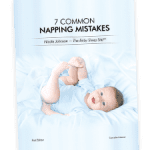
Catnaps. Mini-naps. Micro-naps.
Whatever name you give them, short naps can feel like the bane of your existence as a mom or dad. It may seem like you spend an eternity trying to help your baby fall asleep at nap time, only to have her wake 20 minutes after you lay her down. Not exactly restful for anyone!
So why do some babies tend to take short naps? Is there an underlying reason? And (most importantly) – is this a problem you can fix? Those are the questions we are tackling in today’s blog article.
Short Baby Naps: What Is Normal, and What Is Not
First, let’s define our terms. A short nap is a nap that’s less than an hour long. It can be as short as a few minutes! A long nap is one that’s 60 minutes or more. Most parents can expect 1 – 1.5 hours for a long nap, although some babies and toddlers will take longer naps (especially toddlers who have transitioned to just one afternoon nap – those naps can be as long as 2-3 hours!)
Second, let’s be clear about something: short naps are not unusual, or abnormal, for newborns. Remember, during the newborn stage, babies need to eat every 2-3 hours, so it is understandable that newborns take lots of mini-naps throughout the day.
As your baby grows, and as his brain and body develop, his short naps should begin to consolidate into several longer naps. And those naps should gradually organize themselves into a semi-predictable daytime schedule. Over time, your baby will continue to drop naps, and the naps themselves will gradually become longer. By the time your baby is a toddler, she will be taking one long nap in the middle of the day.
Third, remember that older babies may take a catnap each day when they’re approaching (or in the midst of) a nap transition. For instance, many 7 month olds take a third catnap late in the afternoon, as they transition to a two-nap-a-day schedule. This catnap is not a problem, provided the other 2 naps are an hour or more.
Not All Babies Naturally Consolidate Their Naps
Note the ‘shoulds’ in that last section. Not all babies consolidate their naps easily (or at all, for that matter!) Some of this nap consolidation is dependent on your baby’s unique growth and development patterns; the simple fact is that some babies are biologically ready (and willing) take longer naps much sooner than other babies. Some babies will begin this process of nap consolidation quite early – as early as 4-6 weeks. Other babies will do this much later – more like 5 or 6 months. So if your baby is past the newborn stage, but continues to take mini-naps, understand that some of this may be due to biology.
Of course, you don’t want to spend the next 3 years blaming biology for your little one’s short naps! 😉 So, what’s the cut-off point at which you can consider your baby’s short naps a problem to be solved, and not simply an indication that she’s just not ready for longer naps? Generally, if your baby is less than 6 months old, consider her catnaps normal, and a sign that she’s still figuring out how to nap. After the 6 month mark, though, if your baby is still taking constant catnaps, you can work on improving naps.
Why Does Your Baby Take Short Naps?
So, why do babies who are older than 6 months continue taking short naps? There are several possibilities, including…
- …schedule problems. Ensure that your baby’s daily nap schedule is one that jives well with her sleep needs, and with her bedtime and morning wake-up time. Need help creating a schedule that’s optimized for sleep? Check out our suggested sleep and feeding schedules by age.
- …inconsistency. Unpredictability in the daily routine tends to mess with naps, especially for babies who are sensitive to change. If your baby is napping at different times each day, or in different places, it will be even harder to help her take long restorative naps. If this is a problem in your home, work to establish predictable daily routines, and strive to make sure that naps happen at home, and not naps on-the-go.
- …too much wake time between naps. It may seem like stretching your baby’s wake time will help him take longer naps (since, theoretically, he would be nice and sleepy when nap time rolled around). But the opposite is actually true; keeping your baby awake too long will make him overtired, which will, in turn, make naps even worse. You’ll know your baby is overtired by his cues; if he’s rubbing his eyes, yawning, looking glassy-eyed, and fussing (or possibly wailing), then he is likely overtired.
- …sleep associations. This is probably the biggest reason why babies who are over 6 months take short naps. If your baby still relies on being fed or rocked to sleep, or if your baby needs you to replace the pacifier every time it falls out in order to fall back to sleep, then take this as a sign that your baby doesn’t know how to fall asleep on her own. And if she can’t fall asleep on her own, then when she wakes in between sleep cycles during her nap, she will cry. If sleep associations are a problem for your baby, then it may be time to consider changing those associations through sleep coaching.
Nicole’s Note:
“One of the most misunderstood facts about baby sleep, in my experience, is that waking is not normal. We ALL wake briefly between sleep cycles and a baby’s sleep cycles at nap time will be about 30-45 minutes. The key is not to wake ‘too much’ for something to be replaced such as a bottle, pacifier, breastfeeding, bounce on a yoga ball, etc.”
How To Lengthen Your Baby’s Naps
 Short or non-existent baby naps can be so frustrating – but you don’t have to suffer through them! We have a ton of nap resources – and one of those nap resources is our free guide, 7 Common Napping Mistakes. Are you making any of these common nap mistakes? If so, they may be the cause of your baby’s non-napping. So download your free guide today, and start putting the tips to use as early as your baby’s next nap!
Short or non-existent baby naps can be so frustrating – but you don’t have to suffer through them! We have a ton of nap resources – and one of those nap resources is our free guide, 7 Common Napping Mistakes. Are you making any of these common nap mistakes? If so, they may be the cause of your baby’s non-napping. So download your free guide today, and start putting the tips to use as early as your baby’s next nap!
Whatever the reason, rest assured that if your baby is past the newborn stage, then short naps are an issue that can be solved.
For even more nap and schedule help, check out these members-only resources, found in our VIP Members Area:
- Mastering Naps and Schedules e-Book (unlimited VIP member access at no extra cost!)
- Custom Schedule-Maker (unlimited access – make as many schedules as you’d like! Includes meal times)
- Nap Transitions audio course with Nicole Johnson
- Short Naps audio course with Nicole Johnson
- How To Put Your Child on a Schedule audio course with Nicole Johnson
- 5 Tips To Manage Nap Transitions [EXPANDED VIP MEMBER-ONLY VERSION]
- 5 Tips For Handling Tough Daycare Nap Schedules [EXPANDED VIP MEMBER-ONLY VERSION]
- Day-by-Day Nap Training Plan
- Downloadable Sleep/Nap Coaching Plan Workbook (learn how to create your own nap coaching plan!)
- Printable Sample Schedule Shifts Forward (great for daylight saving’s time change)
Not a VIP member? Not a problem! Join today, and you’ll receive instant access to our vast online library of sleep coaching resources.








